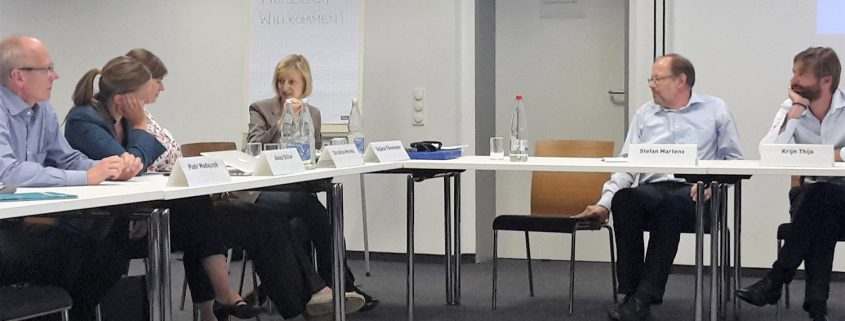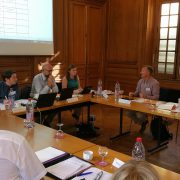Workshop: Occupied Societies in Western Europe: Conflict and Encounter in the 20th Century, Essen, July 7–8 2016
Markus Wegewitz (Jena)
Over the last three years, the concept of the “Occupied Society” has come to be one of the significant innovations in the historian’s treatment of the history of the Second World War. For occupation was treated as the history of German rule in various national contexts. Moreover, the history of the occupation contributed in many cases to the moral fabric of the post-war societies, which defined themselves within the framework of “resistance” and “collaboration”. The workshop “Occupied Societies in Western Europe” sought to challenge these traditional approaches firstly by advocating for a comparative European analysis and secondly by supplementing political history with social, economic and cultural perspectives as well as the history of everyday life and experience.
Focused mainly on Belgium, the Netherlands and France, the individual contributions to the workshop detailed numerous examples of how the policies of occupation left their imprint in different local contexts. The National Socialist conceptions of social order influenced the development of the welfare system in Belgium as well as the food rationing system in post-war France. The institutional entanglement between occupier and occupied shaped the agency of individual historical actors, who experienced (forced) encounters with the German regime. Simultaneously, those encounters presented hitherto unknown opportunities as well. From the conductor hoping to establish an independent Dutch musical culture under the auspices of German rule to the French forced labourer getting to know a small rural town in Germany, the Workshop detailed a multitude of the experiences of occupation far from any clear-cut notion of “resistance” or “collaboration”.
The theoretical and methodical aspects of a comparative analysis of the different Occupied Societies in Europe were of special interest. In this regard, the cautious analysis of occupied Poland provided by Piotr Madajczyk presented a vocal plea against neglecting the unique circumstances of the German occupation in Eastern Europe. Especially the presence of mass violence in the everyday life in the marks a stark difference to the Occupied Societies in Western Europe. The ensuing discussion established the need for a careful approach to a European history of the occupation, which does not dwell on artificial similarities or categorical differences, but focusses on sound historical connections instead. Not only in this regard, the Workshop marked one further step towards a better understanding of life in occupied Europe.
The workshop was organized as a cooperation between the Institute for Advanced Studies in the Humanities Essen, the Bergische Universität Wuppertal, the Duitsland Instituut Amsterdam and the German Historical Institute Paris. A publication of the individual contributions to the workshop in an issue of Francia is planned.
A detailed German report of the Workshop from the author may be found here
A detailed report on H-Soz-Kult can be found here




Dein Kommentar
An Diskussion beteiligen?Hinterlasse uns Deinen Kommentar!